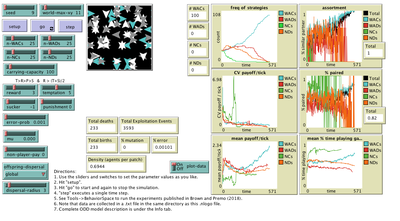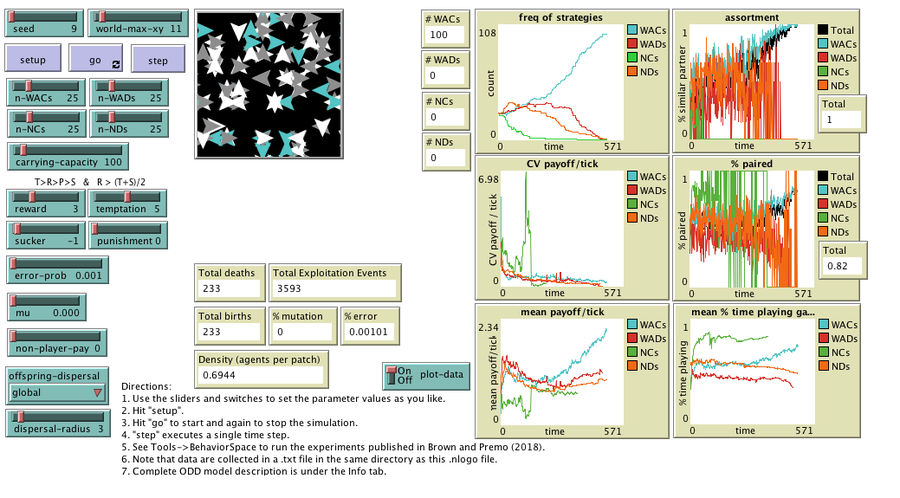Opportunity cost of walking away in the spatial iterated prisoner's dilemma (1.0.0)
Previous work with the spatial iterated prisoner’s dilemma has shown that “walk away” cooperators are able to outcompete defectors as well as cooperators that do not respond to defection, but it remains to be seen just how robust the so-called walk away strategy is to ecologically important variables such as population density, error, and offspring dispersal. Our simulation experiments identify socio-ecological conditions in which natural selection favors strategies that emphasize forgiveness over flight in the spatial iterated prisoner’s dilemma. Our interesting results are best explained by considering how population density, error, and offspring dispersal affect the opportunity cost associated with walking away from an error-prone partner.

Release Notes
Op_Cost_Walk_Away.nlogo
VERSION 1.0 (November, 2018)
The model accompanies:
Premo, L. S. and J. R. Brown (2019) The opportunity cost of walking away in the spatial iterated prisoner’s dilemma. Theoretical Population Biology.
The purpose of the model is to address the following research question: how does population density, error rate, and offspring dispersal affect the success of “walk away” strategies in the spatial iterated prisoner’s dilemma?
The model runs on NetLogo 6.0.2. Note that the code may need to be modified to run on later versions of NetLogo. You can find the experiments we used to collect the data for the paper in BehaviorSpace.
Associated Publications
Opportunity cost of walking away in the spatial iterated prisoner's dilemma 1.0.0
Submitted by
Luke Premo
Published Apr 03, 2019
Last modified Apr 03, 2019
Previous work with the spatial iterated prisoner’s dilemma has shown that “walk away” cooperators are able to outcompete defectors as well as cooperators that do not respond to defection, but it remains to be seen just how robust the so-called walk away strategy is to ecologically important variables such as population density, error, and offspring dispersal. Our simulation experiments identify socio-ecological conditions in which natural selection favors strategies that emphasize forgiveness over flight in the spatial iterated prisoner’s dilemma. Our interesting results are best explained by considering how population density, error, and offspring dispersal affect the opportunity cost associated with walking away from an error-prone partner.
Release Notes
Op_Cost_Walk_Away.nlogo
VERSION 1.0 (November, 2018)
The model accompanies:
Premo, L. S. and J. R. Brown (2019) The opportunity cost of walking away in the spatial iterated prisoner’s dilemma. Theoretical Population Biology.
The purpose of the model is to address the following research question: how does population density, error rate, and offspring dispersal affect the success of “walk away” strategies in the spatial iterated prisoner’s dilemma?
The model runs on NetLogo 6.0.2. Note that the code may need to be modified to run on later versions of NetLogo. You can find the experiments we used to collect the data for the paper in BehaviorSpace.

